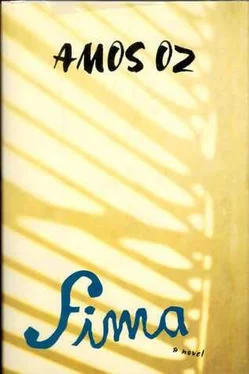It occurred to him that he ought to sit down and compose a short but heartfelt appeal to the hawkish right. To suggest to them, in Ha'arets , the broad outline of a partial national consensus. A sort of new deal between the moderates and the nonmessianic hawkish element, which might be willing despite everything to swallow a return of some of the Territories were it not for what it sees as the left's tendency to uncontrolled appeasement. The taxi driver was right: Our worst mistake over the past twenty years has been not to take seriously the sensibilities of Pizanti and his wife and hundreds of thousands of other Israelis like them, in whom the Arabs stir genuine feelings of anger, fear, and suspicion. Such feelings surely deserve not contempt but a gradual rational effort to allay them by means of intelligent argument. Instead of reasoning with them, we emptied a chamberpot full of patronizing ridicule on them. It would make sense therefore to try to draw up an agreement that would define the precise limits of our, the moderates', willingness to make concessions to the Arabs. So that they don't imagine, like Baruch, that we arc, so to speak, advertising a going-out-of-business sale. So that they know what we, the left, are even prepared to go to war for again, if it turns out that the Arab side is reneging or taking us for a ride. In that way, we may be able to mollify some of the hawks and bring about a thaw.
The word "thaw" reminded him that he had forgotten to light the heater. Bending down, he was relieved to discover that there was enough kerosene left. After lighting the heater, he felt the need to consult Tsvi Kropotkin before he sat down to compose his appeal. In his enthusiasm he did not care if he disturbed Tsvi in the middle of shaving again, because he felt his new idea was potentially fruitful and beneficial and indeed very urgent. But once again the telephone was silent. Fima thought the silence was, if anything, less deep than last night. A sort of intermittent rumbling sound, like the grinding of teeth, was almost audible. A moaning from the depths. Fima diagnosed faint signs of life, a first indication of recovery. He felt sure the instrument was not dead but merely in a very deep coma, and that now, even if it had not recovered consciousness, it was beginning to make a feeble response, a faint groan of pain, a slight pulse giving grounds for hope. Even taking into account the fact that the fridge had just started rumbling in the kitchen. It was therefore possible that the hope was not premature.
Even the expression "hawkish element" suddenly struck him as repugnant: it was wrong to characterize human beings as "elements." Besides which, he thought it was ridiculous to put the right-wing thinkers on the psychiatrist's couch: it was not as if our camp was the embodiment of sanity. We too are troubled by despair, frustration, and rage. We too are caught in an emotional tangle, no less than our opponents. No less than the Arabs. Besides which, the expression "our camp" is utterly ridiculous. What does "our camp" mean? The whole country is a front line, the whole nation an army. Everything is divided into camps. The forces of peace. The battalion of moderation. The shock troops of coexistence. The sentries of disarmament. The commando of the brotherhood of nations. The spearhead of reconciliation.
Instead of writing the appeal, Fima went and stood at the window to put his ideas in order. He watched the winter light spread like a noble material over the hilltops and slopes. He knew and loved the idea of "noble metals," although he had no idea which they were. Once, in his father's flat in Rehavia, Baruch and Dimi tried to inflict an elementary chemistry lesson on him. Fima, like a stubborn child, defended himself with wisecracks and wordplay until Dimi said, "Forget it, Granpa; it's not for him." And the two of them embarked without him into the realm of acid and alkali, which Fima loathed on account of his heartburn.
The light kissed the ridges, overflowed into the valleys, awakening in each tree and rock its dormant radiant quality that had been buried all these days under layers of gray, inanimate routine. As if here in Jerusalem thousands of years ago the earth had lost its power to renew itself from within. As if only the gracious touch of this enchanted light could restore to things, however ephemerally, the primordiality that had been eclipsed in days of old. Will Your Worship condescend to favor me with a slight nod of the head if I go down on my knees and offer my humble prayers of gratitude? Is there something that Your Worship wishes me to do? Is Your Worship interested in us at all? Why did you put us here? Why did you choose us? Why did you choose Jerusalem? Is Your Worship still listening? Is Your Worship smiling?
The ancient Aramaic phrases, such as "the days of old," "not of this world," "the concealed side," filled Fima with a sense of mystery and awe. For a moment he asked himself if it was not possible after all that the light and the mud, the glowworms in the almond tree and the radiant sky, the arid land extending eastward from here to Mesopotamia and southward to Bab el-Mandeb at the tip of the Arabian Peninsula, and indeed his shabby flat and his aging body and even his broken telephone, were all nothing but different expressions of the same being, a being condemned to be broken into countless flawed, perishable embodiments, even though in itself it was whole and eternal and one. Only on a winter morning like this, under the nuptial veil of limpid light, which is perhaps what is meant by the ancient Aramaic phrase "supernal radiance," does the earth along with your watching eyes recover the thrill of that primordial touch. And everything returns to its state of original innocence. As on the day of creation. And for an instant the constant murky cloak of dreariness and deceit is removed.
And so Fima's thoughts arrived at the hackneyed concept of "the heavenly Jerusalem," to which he gave his private interpretation, valid solely for what he felt at that particular moment. He mused that there were times when the state of sleeping seemed less tainted with falsehood than the state of waking, and times when it was the other way around, and that ultimate wakefulness was the most longed-for ideal. He now reached the thought that it might be a matter of three states and not two: sleeping, waking, and this light that had been flooding him both from without and within ever since the start of this morning. For want of a suitable name he described the light to himself as the Third State. And he felt that it was not only a matter of the pure light on the hills but of the light truly flowing out of the hills and out of himself too, and that it was in the commingling of these rays of light that the Third State came into being, equidistant from complete waking and from the deepest slumber and yet distinct from both.
There is no more tragic loss in the whole world, he thought, than missing the Third State. It happens because of the news on the radio, because of business, because of hollow desires and the pursuit of vanities and trivia. All suffering, Fima said to himself, everything that is ridiculous or obscene, is purely the consequence of missing the Third State, or of that vague nagging feeling that reminds us from time to time that there is, outside and inside, almost within reach, something fundamental that you always seem on the way to yet you always lose your way to. You are called, and you forget to go. You are spoken to, and you don't hear. A door is opened, and you leave too late because you choose to satisfy some craving or other. "The sea of silence casts up secrets," but you were preoccupied with trivial arrangements. You preferred to try to make an impression on someone, who himself missed it because he wanted to make an impression on someone else, who also… and so on, and so forth. Unto dust. Again and again you rejected what exists in favor of what does not, never did, and cannot. Gad Eitan was right when he said that wastefulness runs riot here. His wife was right to get away while she could. The order of priorities, Fima said to himself sadly and half aloud, is all wrong. What a pity, for instance, that Tsvi Kropotkin, such a hard-working man, should have spent three years chasing after the details of the Catholic church's attitude to the voyages of Magellan and Columbus, like someone sorting out the buttons of clothes that have long since become rags. Or Uri Gefen, running from one affair to the next, wide awake but with his heart asleep.
Читать дальше












